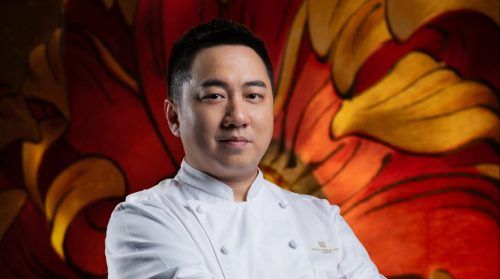I freely admit that at the end of my interview with Santa Teresa Rum CEO Alberto Vollmer, we were both crying. Our conversation began with a discussion on rum and the challenges of running a business in a country as politically challenging as Venezuela. But as it went on, I realize that Alberto is a rare human being – who understood both the demands of modern capitalism, and the demands of being a humane person. One required him to be shrewd and intelligent in how he approached business, the other required him to care, nurture, support, uplift, to see the humanity in others. Most of us struggle to balance the two. For Alberto, it’s what he does day-to-day, and how he defines his leadership.
Alberto is the CEO of Santa Teresa, a Venezuelan rum company established in 1796 famed today in much of the Spanish-speaking world for Santa Teresa 1796 Solera Rum, a unique, deeply refined, wonderfully complex rum with flavour notes of nuts, leather, vanilla, cinnamon, dark chocolate, prunes, hints of honey and pepper. It’s amazing on its own as an aperitif, but is also perfect for cocktails, as its complexities highlight the flavours of different ingredients.
Alberto’s family has owned Santa Teresa for five generations. When he took over as CEO in 1996, the company was in dire straits. Years of mismanagement has resulted in the company filing for chapter 11 bankruptcy. But he turned it around with a natural shrewdness. He took the company – and its rum – even further when he expertly modified the Solera method, the famed process that elevates the quality and flavour of sherry and ports, to meet Santa Teresa’s unique specifications. Since the barrels were first filled in 1992, the Solera casks, containing a complex blend of rums aged at least 35 years, have never fully emptied. Instead, each time a bottle is drawn, the Solera is topped up with a slightly younger rum blend, guaranteeing that every bottle has exceptional richness and a little bit of the ‘Ron Madre’ or Mother Rum.

What elevates Santa Teresa even more is the soul of the company. Through Project Alcatraz, an initiative Alberto started after the business premises were attacked by gangs, Santa Teresa helps reform hardened criminals and gangsters in Venezuela through vocational training and rugby. Those who graduate from the programme become brand ambassadors – some even take high-ranking positions within the corporate structure of Santa Teresa.




We sat down together ahead of the Santa Teresa launch in Singapore at The Kempinski Hotel’s The Bar at 15 Stamford and spoke at length about the spirit – and soul – of his company.
Tell us about your journey here.
I’m a civil engineer and I was working on low-cost housing developments in Venezuela. And then one day I got recruited by my father, who’s fourth generation (of the family-owned Santa Teresa brand). I’m fifth generation. And it was basically to carry out a mission because the CEO was about to leave. I started in production – I was basically a supervisor in production, then I was put in charge of the export department to restructure the department. Several years went by and the company went into chapter 11 – it was being mismanaged, and that had to do with another CEO. There was another CEO after that one, and then it was me. So my baptism of fire was in turning the company around, to save it from bankruptcy. I had to turn it around, you know, refinancing all the debt, redefining our strategy, sort of cut away a lot of the noise and focusing on the important stuff, and then getting the company on to an international strategy.
What you did with international strategy has been amazing – we don’t see many Venezuelan brands launching in Singapore. What was your approach in bringing Santa Teresa to the world?
After the turnaround, we asked ourselves: How do we build the organization? How do we build the brand locally, and how do we build the brand internationally?
So we ventured into several markets of the US, Spain. We were and then of course, we had a whole bunch of other countries but the focus is we’re on New York, Miami and and Spain. And then of course, we had a little bit of business in in England, in London and in France. We we were focused on the Spanish market, and that grew a lot. Meanwhile in Venezuela, we were also not only struggling with the political environment, which was strenuous for our business.
With all due respect, it must have been difficult to do that in Venezuela. It has been relatively unstable for a while.
I would say more than more than unstable. I’d say volatile. When (former Venezuelan President Hugo) Chavez took power in 1999, many things changed, which meant a big challenge to to private property and to business. For many years, it was just a struggle for survival because of the laws and the tax on private businesses. Meanwhile, we had to develop this international business while growing the national business.
For businesses, the biggest challenge was not to be seen as an enemy of the state. And so under that sort of situation, we were always having to struggle. But at the same time, that adversity strengthened us. We had to survive those very complicated situations because we were facing everything from price controls to hyperinflation. Venezuela was a very insecure country.
Did that affect you guys directly?
There was a challenge against old established companies like ours because they were seen as potential competitors against the government. In 2000, we had a big land invasion, which means there were a whole bunch of people who were rallied by the government just take over your land and property. What we did with that invasion was that we turned it around. We spoke to them and turned the invaders into allies. That gave us a new way of understanding and handling these political challenges.
And then in 2003, we had another very big challenge. The company was attacked by gang members. Of course, in a normal company you call the police, but in Venezuela you don’t have that luxury. And in a situation like this, if we didn’t respond strongly, we would be very vulnerable. So our Head of Security managed to catch one of these guys. And he asked me what we should do.
What did you say?
So I said, turn him in to the police so he realizes the consequences of his actions. But when he sent him to the police, he found out that they were basically going to execute him. So my Head of Security calls me up and asks, “What do I do, because they’re going to execute him.” So I say, “No, that’s not going to happen. Do whatever you have to do to negotiate with the police but bring him back.” So he brings him back.
You asked to bring him back? This guy who attacked your company?
(laughs) Yeah, these are the kind of challenges you face in a volatile zipcode. So later, I’m in my office with this guy, who attacked us. And I have this philosophical conversation with him, and at the end I told him I’ll offer him two options: one is you work for us for three months to pay off the damage you did. We’ll give you food and lodging, but we won’t pay you. Or, we hand you over to the police and we forget about what happened. He agreed to the first option.
A few days later, we caught the second guy, who’s the gang leader. We offered him the same two options. He starts working for us. After a few days, he (the gang leader) says, “Listen, I think this might be an opportunity. Do you think you can include another two or three guys?” And I said, “Sure.” I was thinking we could capture the other ones who attacked us. So we set up a meeting, and at the meeting, the whole gang was there – twenty-two of them. A lot of these guys were homicide cases. There, I realised there was an opportunity, and we needed to get them on board. I wasn’t sure how it was going to work. So we started developing a rehabilitation programme for criminals. This was how Project Alcatraz started. After two months, when they were about to go back to the slums, one of them says, “This is cool, but when we go back, we’re going to have to go back to crime and killing – if we don’t want to be killed.”
Yeah that’s true. That’s quite a predicament to be in.
I thought about this, so we ended up recruiting their enemy gang also. We put the two gangs in a small room, and we had a TV and we watched a rugby game together. That’s one of the tools I use in the rehabilitation programme – rugby, because of the ethics and values of rugby. Of course, there was a lot of tension. After the whole thing, I said, “We want to know what the problem is with you guys.” So we talked it out and finally we got the two leaders to the front of the room. I said, “I know you have the guts to kill each other. I want to know if you have the guts to forgive each other.” Finally, they said yes. They shake hands and they make peace.
After that, word spread like wildfire, and in about ten days we had six gangs queueing to enter the project. Little by little, we started putting these gangs through a rehabilitation and reinsertion programme. One of those gangs was the most wanted gang in the country.
How did the government react to this, given the politics in Venezuela?
At first, the government didn’t trust us. They looked at us with a lot of suspicion. They asked themselves, why does this business guy want all these criminals? At first they thought I was building an army against the government. It was a little crazy at first. I’ve been taken to interrogation so many times. We had government special ops come in to our business, to La Hacienda. Eventually we won the officials over by showing them that Project Alcatraz was attacking the cause of our nation’s problems, not the consequences. So little by little, we started building credibility with the authorities. Until finally they wanted to partner with us to take it (Project Alcatraz) nationwide. We didn’t think it was wise, because we still didn’t know if we can control it at that scale.
Moving back to Project Alcatraz – what do you think makes it successful?

I’d say it all has to do with believing in the individuals. We make eye contact, give respect and we don’t put labels. It’s this recognition of the individual that I would say made things change. The thing is, all these guys, they’re aspiring to something better. But the role models they have aren’t the best. So we have to be better role models and point them in the right direction.
One of the things we do in the recruitment process, is that we show them their financial statements. We build financial statements with their profit and loss, their flow and their balance sheet, and all of their many different types of income, even from kidnappings and killings and stuff like that. We use this to prove to them that it’s a terrible business model. So when they see that, then they’re thinking, “Okay, I’m risking my life and risking my kids’ lives. Yeah. But also, it’s not a good business. So how do I find another alternative?” A lot of these guys wind up in that wrong path, because maybe they didn’t have a family that gave them the structure to go in the right direction. So they enter crime at 12, 13 or 14 years old, that’s all they know. So that means rewiring, retraining, getting them to focus on the values that are going to take them in the right direction. We focus on five values at Project Alcatraz: that are respect, discipline, teamwork, sportsmanship, and humility. Those are the five values that we sort of hammer out infinite times a day.
What happens after they go through the programme?
It’s very exciting to see them blossom and turn into these amazing people.Eventually, these guys…some work on their own, but some work in the company, in the production facilities, we’ve got about 12 or 14 of them who are brand ambassadors and represent the brand.

I’m not demeaning it or anything, but purely from a business sense, Project Alcatraz isn’t exactly profitable, is it?
Well, this is funny, because that was a big question for us, the same one you’re asking me. We were asking ourselves four, five years, into the programme. At the board level, the board would ask me, so how much time are you spending on Alcatraz? At the time, I probably spent 60 or 70% on Alcatraz more than on rum. But the thing is, in this context, if we don’t pay attention to Project Alcatraz and to the community, the company is going to disappear.
Project Alcatraz changed the philosophy of the company. What happened is that nationwide, everybody started to know the company more because of Project Alcatraz than the rum. And so this amazing fan base for the brand was coming from all sorts of strange places that we didn’t expect. And then there were instances such as when Project Alcatraz became a case study at Harvard. It was in the press. It was in the media, it was everywhere. We didn’t know how to make the match between the Santa Teresa brand, the rum and Project Alcatraz but as we’re doing this, I’d say the first the first change was a philosophical change. We realised we sort of stumbled on our purpose as a company. I always say that, as a person, the first thing you pursue is your profession. If you’re lucky in life, from profession, you might be able to discover your passion. But profession and passion is to do with you individually. But when you start doing things for others, that’s purpose. So if you can get your those three things aligned, it’s fantastic.

Thank you for sharing all of that. That’s incredible. Let’s get back to Santa Teresa rum – how does Venezuelan rum stand out from other varieties?
There are two or three aspects. The first, I would say is that we have lighter alcohols than the rest of the Caribbean. Venezuela has that really keen characteristic because we were an oil producing country for so many years. Venezuela had access to more funds and financing and distillation technology than the islands. So technically, we have the capacity to go for pure alcohols, which means we can have very, very light alcohols, but we can also have the heavy ones. When you go into the Caribbean, because they didn’t have the same technology they couldn’t get those light alcohols, they only have heavy alcohols. These can be overpowering. They can be more flavourful, but they can go out of whack – you can’t control these flavours. With lighter alcohols, you can be a lot more specific with what flavours your alcohol has.
Second, by Venezuelan law, for rum to legally be rum, it has to be aged for at least two years. In Venezuela we have one really key regulation since 1956, which is for a rum to be called rum, it has to have undergone a minimum two years ageing in oak barrels. It has to be oak barrels. Doesn’t matter if it’s American or French – it has to be oak. So if you don’t have those two years, you’re not rum. And around the world, you have a whole bunch of rums that call themselves rum and they haven’t even been aged. That’s a huge differentiator.
The third element that sets it apart is the denomination of origin, of Ron du Venezuela – Rum of Venezuela. It’s the fact that we got our acts together to register the denomination. At the time it was registered, the industry was all over the place. There were only two or three brands. Under the rules of the denomination, there was a proliferation of new rums. And that increased competition but it also increased cooperation. It allowed the industry to grow, and grow as a synonym of quality.








